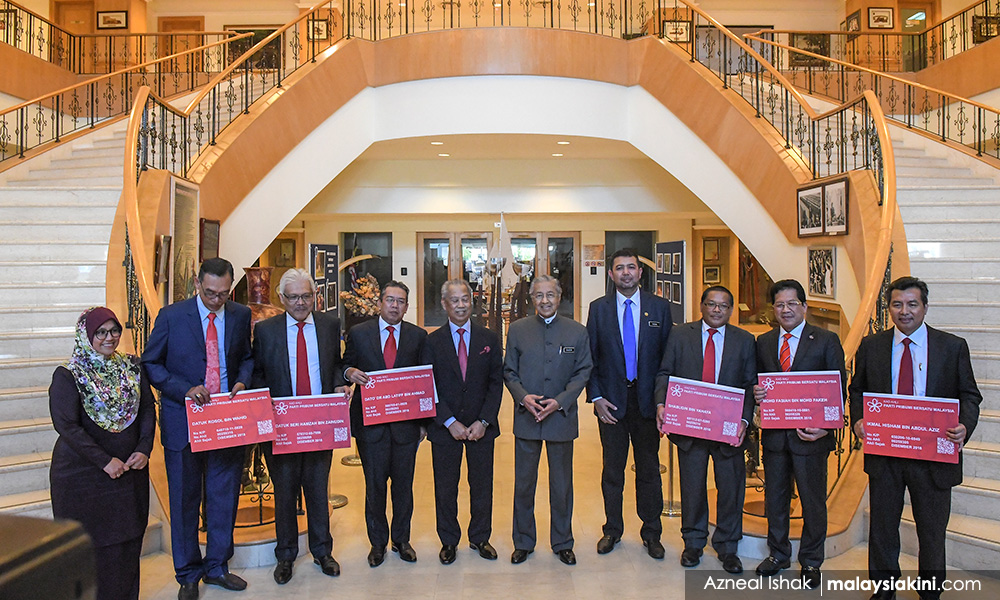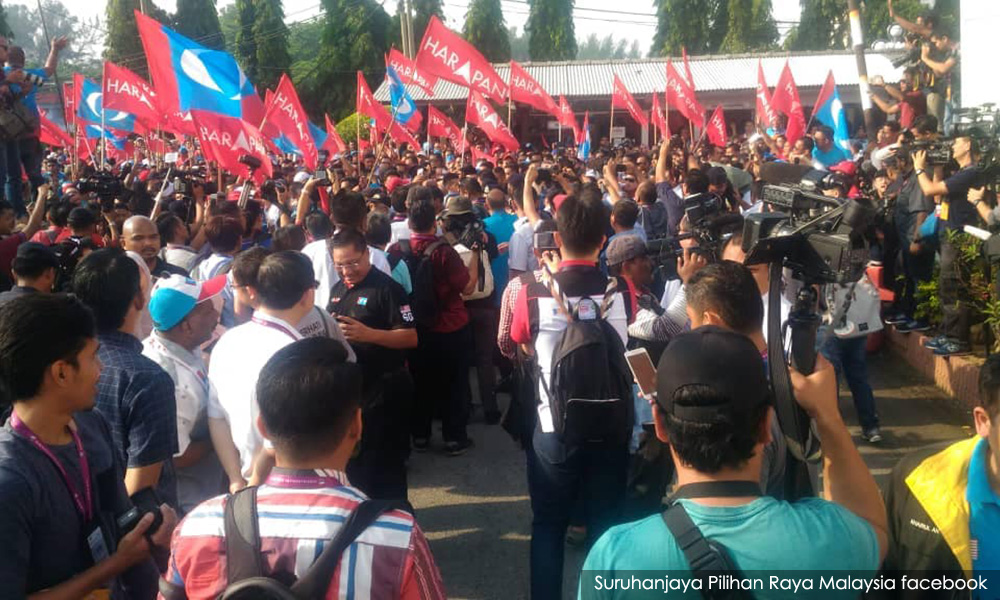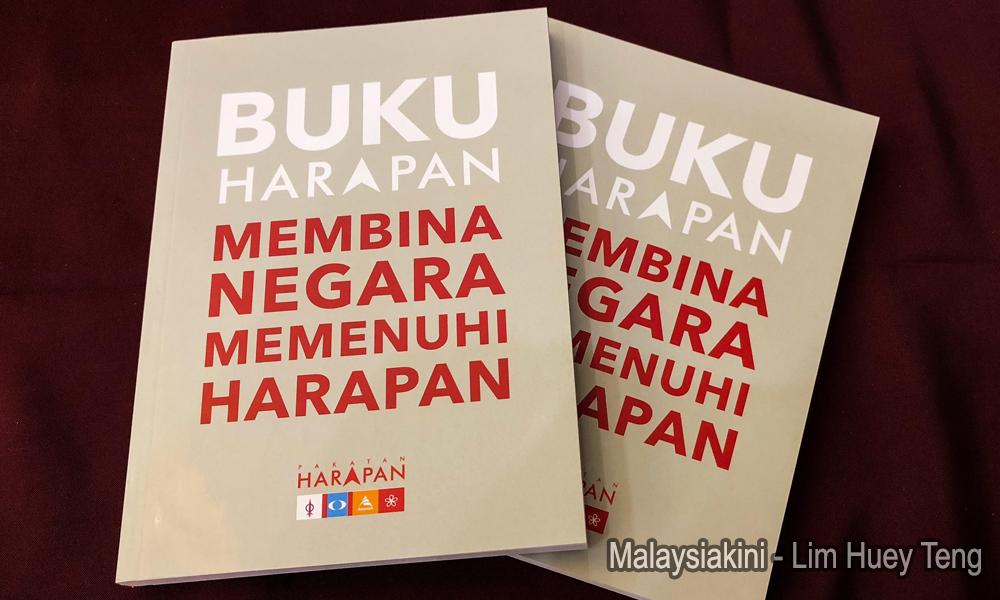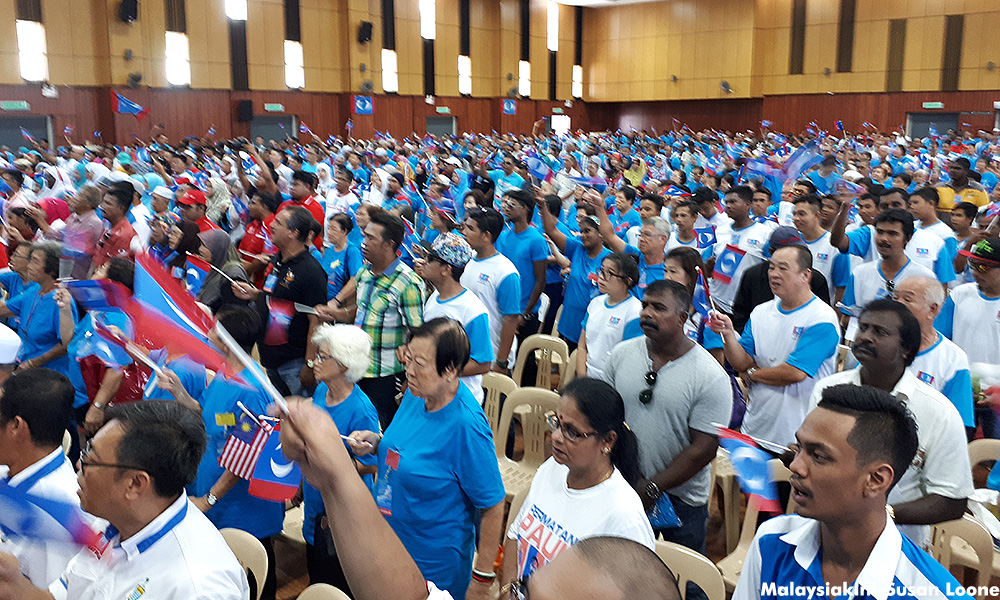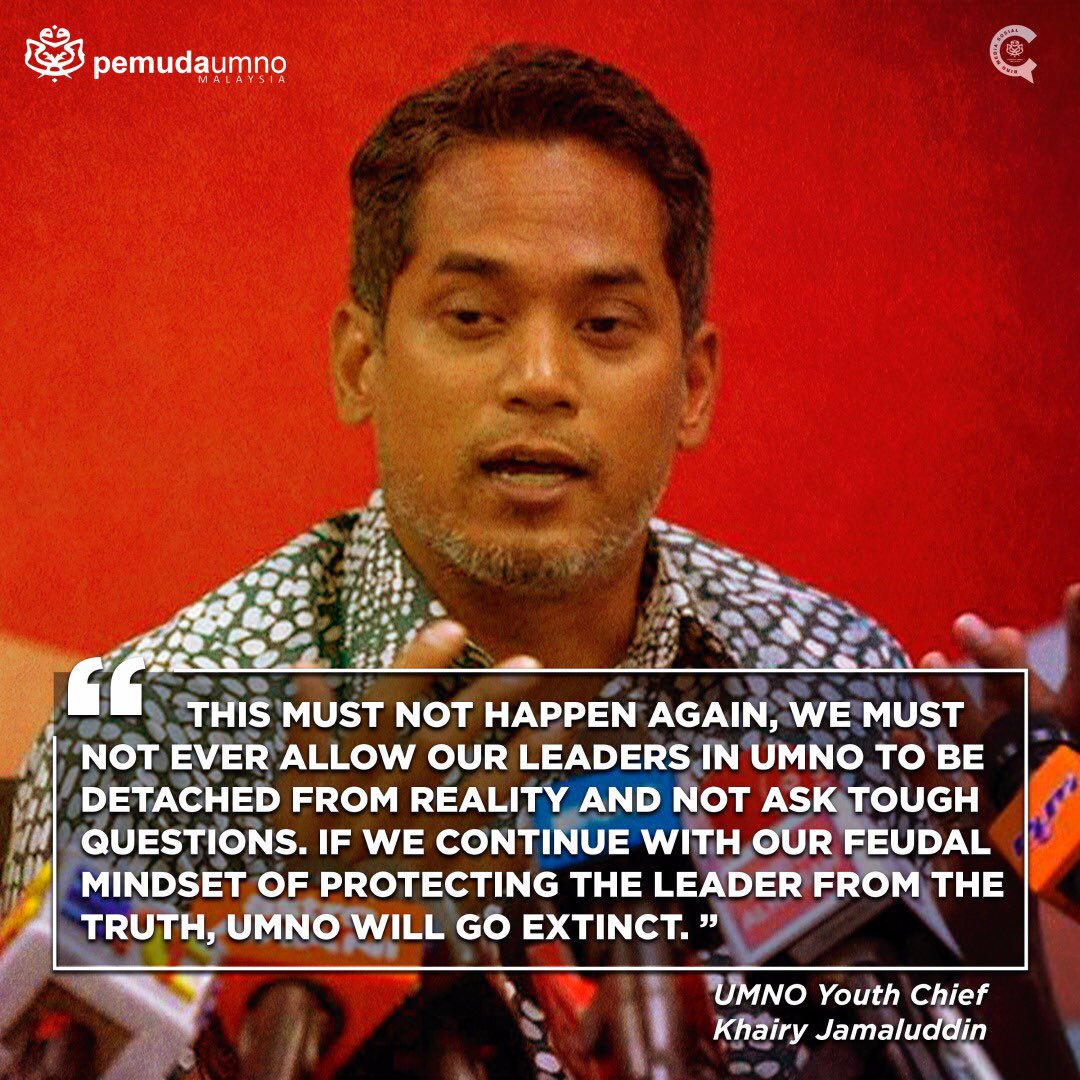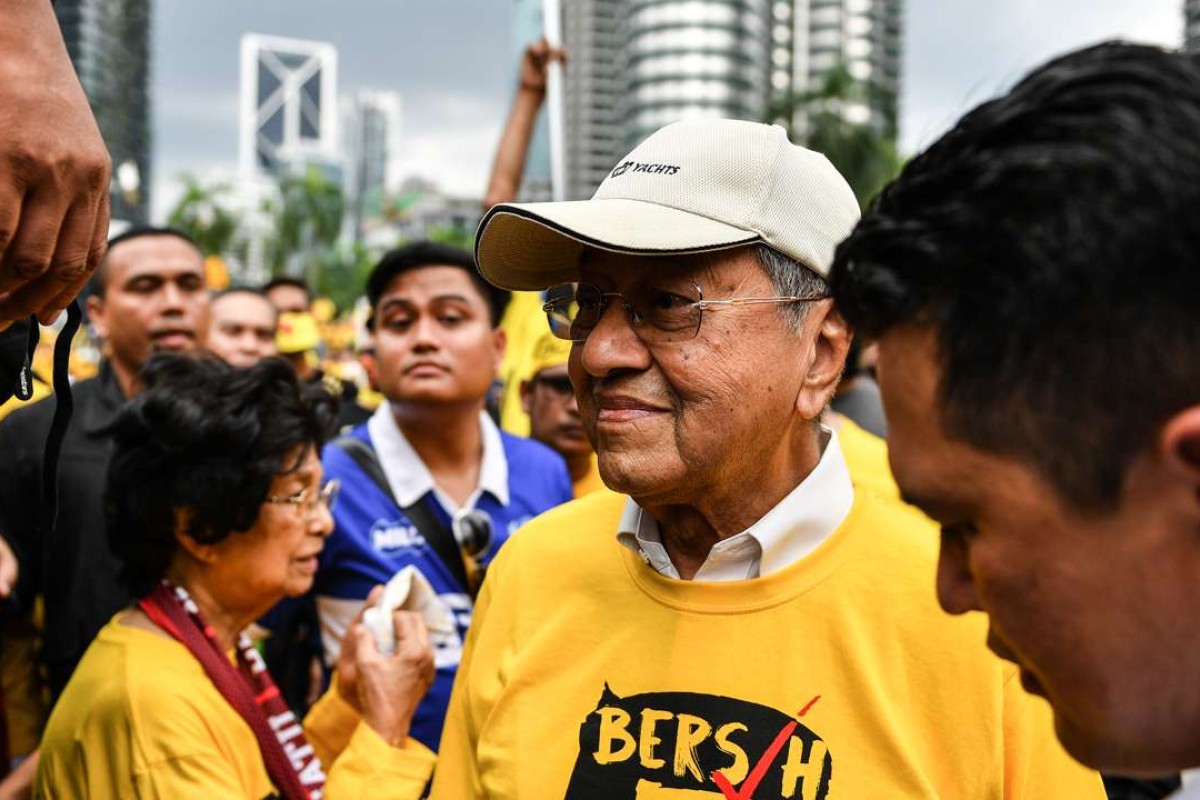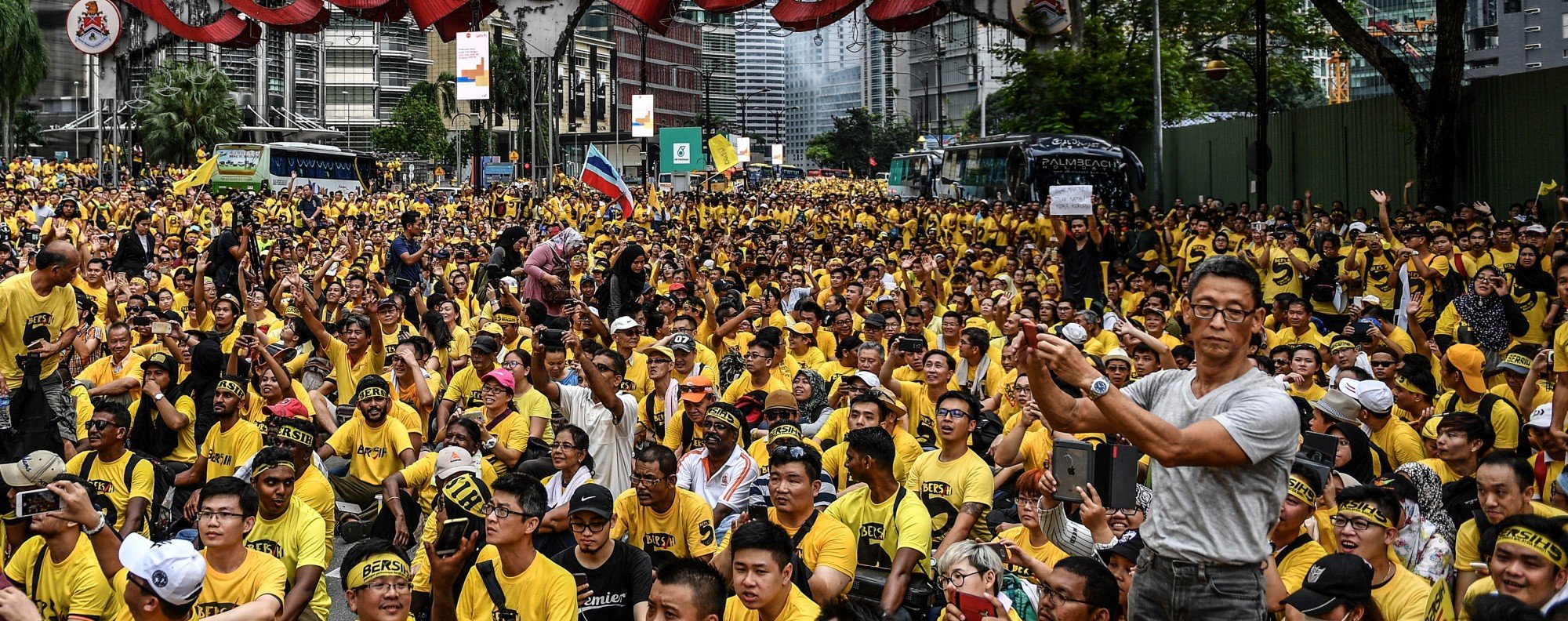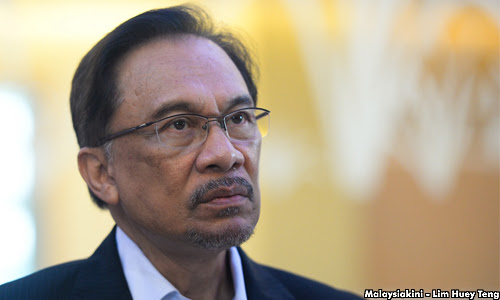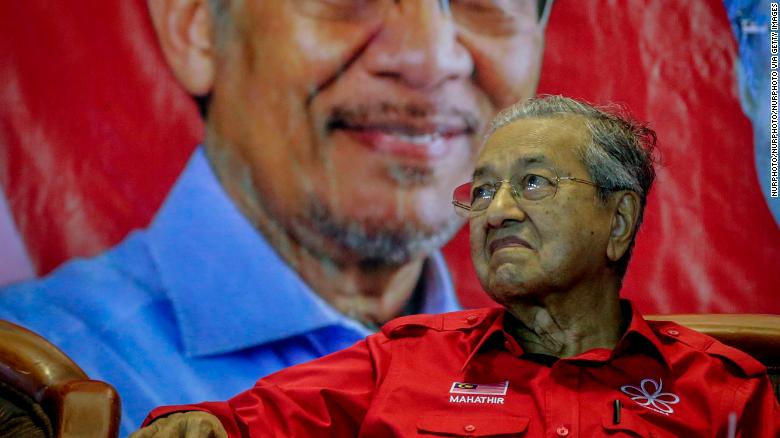It may have been a shock win for Pakatan Harapan in the recent election, but the writing has been on the wall for Barisan Nasional for more than a decade.
AH, finally, change has come! It was simply inevitable.

I have been writing for over a decade of the politically manufactured extremism and intolerance within Malay society and how the 2006 UMNO General Assembly was the turning point when a party that had prided itself as the bedrock of centrist politics, presented an extremist face to Malaysians on live television.
“UMNO had become a gravy train for personal wealth accumulation for most of its leaders and members. The party had so lost touch with the ground that it no longer cared for public opinion. Their rhetoric of Malay dominance, and race and religion under threat was delusional when more and more Malays were rejecting them in favour of a multi-ethnic opposition promising good governance and equitable citizenship rights”.–Zainah Anwar
The histrionics of race and religion under threat, the keris waving, and the full display of Malay-Muslim machismo alienated and scared not just the non-Muslims, but the many moderate and progressive Muslims in the country. UMNO had crossed the line. The belligerent UMNO speakers thought they reflected the mood on the ground, only to fast discover that the ground had shifted from under their feet, as the President tried vainly to do some damage control with his closing speech.
By the 2008 general elections, the resounding victory that then Prime Minister Abdullah Badawi enjoyed in 2004 based on his change agenda was overturned. The rakyat inflicted the most crushing blow to Barisan Nasional. Kedah, Penang, Perak and Selangor fell to the Opposition, and the ruling party lost its much vaunted two-thirds majority.
It all went wrong within just four short years. Abdullah Badawi had led Barisan to its greatest electoral victory ever, winning 199 of 219 parliamentary seats in 2004. He promised to eliminate corruption, to introduce open tendering for government contracts. He regarded the NGOs as the eyes and ears of the government, he stood up for women’s rights and a progressive Islam (Islam Hadhari) that must be re-interpreted to deal with changing times and circumstances. He promised a kinder, gentler Malaysia and more open and democratic politics.
While many of us shared in the fifth Prime Minister’s vision of a democratising, transparent and accountable government and his promise of an inclusive rule for all Malaysians, his failure to deliver on much of this grand vision and his inability to take charge of his change agenda in the face of resistance from powerful centres of power within UMNO, within the civil service, the Police, and even within his own cabinet eventually led to a massive loss of confidence. It was not supposed to be business as usual. But on the ground, it was much too much of the same thing.
From the endless manufacturing of a siege and crisis mentality among the Malays to supremacist speeches in the name of race and religion, from the Lingam tapes to judicial integrity, from rising crime to rising prices, local development without public representation, political leaders behaving badly, and allegations of corruption and cronyism that did not abate…the electorate was in no mood to wait for the promised change to come or to even acknowledge that some change had indeed taken place.
Anything but UMNO
I had written after the 2008 general elections that the massive public repudiation of Barisan was not just a repudiation of the Prime Minister Badawi’s rule, but of all the corrupt, immoral, authoritarianism of Barisan politics and governance in its 50 years of domination. The public has had enough.
That Pakatan Rakyat won votes on a platform of change from “Ketuanan Melayu” to “Ketuanan Rakyat” and a smorgasbord of promises to make democracy and good governance work for ALL citizens was beyond UMNO’s comprehension.
While the new alliance was fast capturing the shifting mood of Malaysian voters to a new political centre of equitable and fairer terms of engagement among the citizens, and between the citizen and the state, and generating excitement among young voters and community groups that their voices could indeed bring change, UMNO members were more preoccupied with power grabbing in the run-up to party elections in December 2009.
They might win party elections whooping their “Ketuanan Melayu” battle cry, but they would cause the party to lose the next general elections, I predicted. The ground had shifted, but they dug deeper into their bad old bag of tricks of race, religion, money politics, and self-enrichment. I never understood what was there for MCA, Gerakan and MIC to stay on with UMNO and its intemperate and relentless stomping and condoning of ethno-religious supremacy that was driving away Chinese and Indian voters into the waiting arms of PKR, DAP and even PAS. The mood indeed was anything but UMNO.
It was clear by 2008 that Malaysian politics was taking off into an epochal transformation from race-based to issue-based, I felt. Increasingly, Malaysians were building new solidarities based on issues, not race or religion. Be it human rights, women’s rights, free and fair elections, democracy, good governance, anti-corruption, freedom of the press, detention without trial, death in custody, local government, environment, land rights, quality education, arts and culture, … it would be issues that would bring Malaysians of all ethnic backgrounds together, I wrote then.
So Abdullah was forced into early retirement and Datuk Seri Najib Tun Razak became the sixth Prime Minister, warning UMNO to “change or perish”. He called on UMNO members to be the eyes and ears of the rakyat so that UMNO could read accurately the pulse of the nation and translate that into policy and action. In grand style, he called on the people to restore the bridges that brought us together and tear the walls that separated us. He introduced 1Malaysia and he wanted repressive laws repealed and UMNO party rules to be more democratic.
Regime crisis
That was 2009. But I wrote early on that Najib might have the dubious honour of being the first UMNO President to become Leader of the Opposition, as I saw no mood for change among UMNO leaders and members. They felt they were the only rakyat that mattered. All they were preoccupied with was to use the race card to enrich themselves – to get more handouts and more contracts into their grubby hands.
Almost 11 months after the 2008 elections, UMNO lost a by-election in Kuala Terengganu as PAS, PKR and DAP displayed unprecedented cohesion and dazzled the voters with their unity, sharing the same platform everywhere.
It had made no difference to UMNO thinking and strategising that 74% of the Malays in the Kuala Terengganu constituency polled a week before polling day believed that “Malay political power was weakened by corrupt and self-serving leaders”, while only 17% said it was weakened by “demands made by the non-Malays”.
UMNO had become a gravy train for personal wealth accumulation for most of its leaders and members. The party had so lost touch with the ground that it no longer cared for public opinion. Their rhetoric of Malay dominance, and race and religion under threat was delusional when more and more Malays were rejecting them in favour of a multi-ethnic opposition promising good governance and equitable citizenship rights.
That a newly cobbled coalition of strange bedfellows could present a united front and work together as a team and sell their multi-ethnic agenda to a Malay electorate showed what a pathetic empty shell Barisan as a multi-ethnic coalition had become.
2009 under the new leadership brought no respite to the rakyat. Incident after incident piled up and we felt as if the country was going to implode. Issues on whether one was a Muslim or not, whether a father who converted to Islam had the right to unilaterally convert his underage children, the sentencing of Kartika to caning for drinking a glass of beer, the arrest and prosecution of then former Perlis Mufti for teaching Islam in a private home in Selangor without a letter of authorisation…the endless sledgehammer of persecution in the name of Islam went on.
By 2010, the likes of the belligerent Ibrahim Ali and Zulkifli Noordin had emerged as the poster boys of UMNO and the future the party believed in. It was their voice and those of their ilk that the government of the day seemed to listen to. Not the voice of Malaysians, who believe in our founding fathers’ vision of a modern, democratic, secular, culturally pluralistic and inclusive political community.

Unpopular tactic: UMNO continued to play on the race and religion sentiments to maintain power, like its UMNO Youth Chief Datuk Seri Hishamuddin Tun Hussein, who brandished the “Keris Panca Warisan” at the begining of their assembly in PWTC in 2011.
Contrary voices were either cowed into silenced or demonised. More demagogues were organised to whip up Malay sentiment against any attempts to discuss concerns arising from the makeover of the Constitutional idea of “the special position of the Malays” into Malay supremacy.
The idea of Ketuanan Melayu sits uncomfortably among many Malaysians, be they Malays, Chinese, Indians, Ibans, Kadazan-Dusun, Bajaus, Orang Asal, Eurasians…. It is a racial supremacist idea, a far cry from the simple reality that Malays as the majority population of this country will naturally be the politically dominant group. And a far cry from the constitutional notion of the “special position of the Malays” which legitimised affirmative action as a temporary special measure to enable a historically disadvantaged group to catch up.
Obviously, Malaysia had entered into another “regime crisis”. The NEP-era political phase and governing mechanism exhaled its last breath on March 8, 2008.The Opposition had still not coalesced into a viable trusted alternative with a common political vision of Malaysia. The Barisan Nasional government showed no resolve to deal with the concerns and contestations over matters of race and religion, and human rights and fundamental liberties. This pessimism about the future of Malaysia continued to corrode the body politic and the public sense of well-being.
By mid-2010, I pronounced in this column that UMNO was beyond redemption. It had regressed into a dinosaur, too huge, too old, too fossilised in its ways to be able to adapt to new conditions. The sense of privilege and entitlement was too entrenched for UMNO members to ever want to change.
While UMNO politicians and Perkasa pointed fingers at other races as a threat to Malay political survival, the Malays themselves saw something else. A Merdeka Centre survey revealed that 70% of Malays felt that the main threat to the Malay political position in the country was corruption among Malay leaders. Only 22% believed it was due to demands made by other races in the country. This national survey reinforced the Kuala Terengganu findings of January 2009.
The changing values and changing mood were clear. A significant 40% of the Malay respondents believed that citizens should be treated and accorded the same rights in Malaysia, regardless of race and religion. Forty-five per cent believed that government assistance programmes only benefited the rich and politically connected. The two top issues all respondents identified as being the most important in need of change were: “making the country more democratic” and “making our education system world class”. But 66% of the public felt a sense of powerlessness that they could influence government policy.
And yet UMNO continued to play its dangerous game for the future of Malaysia. And it did not care that continuing to abuse race and religion unabated spelt the death knell to its Barisan partners who could never hope to deliver the minority votes necessary for the ruling coalition to maintain power.
No political will
The then Prime Minister (Najib Razak) made attempts to bring UMNO back to the centre by calling for the voice of moderation to prevail in Malaysia, reminding UMNO members at the 2010 General Assembly that it was the Malay trait of moderation that had enabled the community to be accepted as leaders in a multicultural society.
But wasatiyyah required political courage and grit. No one in UMNO had the political will to follow words with deeds. Its hypocrisy continued to stench. Sisters in Islam was called in twice by the Police for questioning under the Penal Code and the Sedition Act for standing up for Kartika. For the first time too, a state religious authority issued an official Friday sermon attacking Sisters in Islam and urged the congregation to take action against us.
In frustration, I wrote a column in 2011 on whose voice should prevail in this country. Those who perpetually saw race and religion under threat and demanded that every person who believed, thought, behaved, dressed, acted, opined differently should be “fixed” through many state sanctioned operations – boot camps, rehabilitation camps, punished under the Internal Security Act, the Sedition Act, the Official Secrets Act, the Printing Presses and Publications Act, the Syariah Criminal Offences Act, or just denounced and demonised as enemies and traitors of race, religion and country?
Or those who envision a democratic and just future, where rights are recognised on the basis of citizenship rather than just race, religion, or sex.
The choice was obvious to most of us, the good citizens of Malaysia who loved this country, and who were determined to be resilient, resourceful, and open minded to face the challenges and realities of the 21st century.
The same old script
I was totally frustrated by the endless manufacturing of many more new threats. From the innocuous fun of poco-poco to the relativism of post-modernism, from calling Muslims opposed to UMNO and PAS unification as “pengkhianat Islam” (traitors of Islam) to accusing Christians of plotting to turn Malaysia into a Christian state! All these of course adding to the existing long list of threats that included pluralism, liberalism, feminism, secularism, kongsi raya, open house, tomboys, yoga…
It was hard to understand why these same actors were trotting out the same old script that cost the Barisan Nasional government so dearly in 2008. It’s like as if nobody had learnt any lessons from that political tsunami. Since attacking liberal Muslims and ungrateful Chinese did not work in 2008, they amended the script to add Christians and even the passé Communists. Why would an unpopular political party create more enemies, instead of making friends?
And to be sure they added the promise of the Hudud law and its grim serving of chopped off Muslim hands and feet, stoning to death, crucifixion! What kind of future is that? “It’s ok to implement the Hudud law because it doesn’t affect non-Muslims.” So it’s ok for Muslims to be brutalised? “Non-Muslims should shut up because it doesn’t affect them.” But they are Malaysian citizens who have every right to speak up on laws that allow for brutal and inhumane punishments against their fellow citizens, the majority population to boot. “Muslims who are not experts on Islam should shut up”. Then please take religion out of the public sphere and make it private between us and God.
By 2012, a desperate UMNO, which for two decades under Mahathir’s rule had been consistently opposed to the Hudud law, embraced it as its own. One state assemblyman in Johor proudly proclaimed that the UMNO Hudud would be superior to the PAS Hudud as it would apply to all citizens, Muslims and non-Muslims! And other UMNO leaders and entities in quick succession echoed the call, lest their piety be questioned. And they stoked the debate further by trying to portray the upcoming general elections as a choice between those who wanted the Hudud and the Islamic state and those against.
I wrote then that the choice before us was not between Islam and secularism, not between Hudud law and civil law, not between tradition and modernity. Those were false dichotomies created to divide us. The choice before us was between democracy and despotism, between good governance and corruption, between equality and discrimination, between social justice and inequity.
The UMNO/Perkasa/Utusan Malaysia nexus and its orchestrated battle cry of “Malays and Islam under threat” stoked Malay anxiety – enough to win Umno support and make a nine seat gain in the 2013 general elections. Malays, who saw UMNO as its protector, bought into the emotive appeal that their special rights would be eroded by a Pakatan coalition that stood for affirmative action based on need, rather than race, and Ketuanan Rakyat rather than Ketuanan Melayu.
But the very political strategy that won UMNO support in the rural areas and among some segments of the Malay community, cost Barisan support among the Chinese, Indians and Malays in urban and semi-urban areas. For the first time, Barisan won the national elections with less than 50% of the popular vote.

The demands for reformasi that began in 1999 with the sacking and incarceration of Anwar Ibrahim was steaming ahead. Barisan popular votes went down by 10% then and UMNO and Barisan were saved by support from the Chinese, many of whom were spooked by reformasi in Indonesia. 2004 was just a blip in the downward slide with excitement over promises of change by a new Prime Minister. Performing from bad to worse in two successive general elections was unprecedented.
There were yet more calls for change. This time the then Deputy Prime Minister warned UMNO members to “change or be dead”. But no one was listening. Some UMNO leaders continued to blame others for their failures and shortcomings. And this time they told those who disagreed with them to leave the country. In the past, the retort used to be vote us out if you don’t agree, but by 2013 that was too painfully close to the truth to even utter.
At the UMNO general assembly that year, the debate, in content and tone, did not provide voters with any indication or hope that UMNO was capable of change to win back the support it had lost in two successive elections.
The de rigueur threats were made yet again – from “liberalism, pluralism and secularism”, to threats from people who supposedly attacked “Islam, the Sultans, the national language, the NEP” all rolled in one breath, and threats from oh, those forever ungrateful Chinese. And then, of course, the same old demands for more handouts and economic assistance for the Malays. And nary a curious squeak as to why a Malay dominated government that has implemented affirmative action policies for over 40 years, with billions spent on bumiputra empowerment and economic advancement plus dozens of accompanying policy instruments, have still failed to address the needs of those left behind and build the resilient commercial and industrial community as envisaged.
Tan Sri Muhyiddin Yassin, UMNO Deputy President, gave a dire warning in his closing speech – that just a 2% swing in votes will cost Barisan to lose power.
Forty-four of the 133 Parliamentary seats Barisan held were regarded as “grey” seats where the party had won by a mere majority of between 0.1 and 5.9%. Without new initiatives to appeal to the electorate, Barisan would be in a “precarious position”, he warned.
I met a few UMNO leaders who were at that general assembly who said they cringed listening to the speeches and the non-debates. They felt they were in a sinking ship.
Then why didn’t you and people like you in UMNO speak out, I asked.One said, “Are you kidding me. I speak out, I turn my back, no one is behind me.” Another said, “I speak out, they will send the income tax guys knocking on my door at 3am.”
The dinosaur was truly paralysed and rotten to the core. Malaysia has changed, more and more Malays were changing, but UMNO remained trapped in a dance hall, partying to its own music, oblivious that extinction was near.
In July 2015, I wrote a column, feeling choked and suffocated that this country and its rakyat were being crushed and pummelled by wrecking balls. The wrecking ball of race and religion, of insatiable greed, of desperation to stay in power, of never-ending sense of entitlements, of unpunished crimes and abuses, of ideology over rational thinking, justice, and fair play. These concerns were nothing new. What was new was the breathtaking scale, the endlessness of it all, and the shamelessness with which the perpetrators displayed their unscrupulous, destructive and criminal behaviour, in words and deeds.
The 1MDB scandal had broken. We began to live in an Orwellian world where bad was good and good was bad, where those who revealed abuses and scandals were detained, questioned, prevented from travelling, charged in court, sacked from their positions, while those accused proclaimed their innocence and carried on unimpeached, and buttressed to remain in power.
By this time, I felt UMNO was committing hara-kiri. It added yet more mind-boggling threats – “national security” and “parliamentary democracy” it seemed were now under threat as more and more damning evidence of kleptomaniac behaviour at the very top was revealed. To continue to talk about it posed a threat to the stability of the ruling party and therefore a threat to democracy and national security! What a mind leap we were supposed to exercise to believe in this Orwellian construction of truth.
I never understood why UMNO leaders or all the Barisan MPs still could not see that their rule was over. If the Prime Minister continued to lead the party, they would lose GE-14. Didn’t they consider working together to put pressure on him to step down in order to save the party and the country? Didn’t they consider working together with the Opposition MPs to mount a no-confidence motion in Parliament? It was staggering that a Prime Minister could ever accept RM2.6 billion dollars into his personal account – and still remain in office. It was as simple as that.
But too many on the UMNO bandwagon remained dazzled by the millions that had been dispensed to them and the many more millions that they could still make in power. So right up to May 9, they believed they would still obtain a handsome victory at the polls. The unthinkable, they thought, could not happen with the money spent, the gerrymandering and malapportionment, the mid-week polling day, the mainstream media on their side, the threat of arrests under the fake news law, the threat of an emergency under the new national security act.

But we Malaysians have had enough. The promise of change and the reality that it could happen was electrifying as a 92-year-old indefatigable former Prime Minister stomped the country to convince enough of those who were scared of change that they would be in good hands with him at the helm. My friends and I knew this was the best chance to overthrow a party that had been in power since independence day. For the first time ever, we collected money to donate to candidates of our choice.
Many of us in the women’s movement volunteered for Maria Chin, raised funds, managed her Bilik Gerakan, helped with her communications, outreach, worked as PACAs, pounded the streets at markets and neighbourhoods, and trudged up and down low-cost flats, to reach out to the voters in Petaling Jaya. We headed to as many ceramahs as possible in the Klang Valley. The idealistic fresh faces standing on stage promising a new democratic, inclusive, and clean government gave us hope.
While so many friends were still too scared to predict the outcome for certain, I just felt it in my old bones that Pakatan Harapan would sweep into power.
UMNO has no one else to blame but itself that Malays no longer see it as the protector of the race and religion. In swinging to the far right and representing the interest of only one segment of the Malay community, it lost the faith of many others that it was able to steer a moderate path to maintain Malaysia’s political stability and prosperity in collaborative partnership with others.
Today, the sun is shining again and I am so, so proud to be Malaysian. We bucked the global trend of elections bringing into power conservative and right wing parties. My friends abroad were thrilled that we Malaysians did it! – Through peaceful elections and a relatively smooth democratic transition to a new ruling coalition that stands for reform. If in the recent past they had asked me in despair what went wrong with Malaysia as it became known for the biggest kleptocracy scandal ever, this time with envy, they asked, “How did you do it?”
The Malaysian electorate has for decades wanted to see change in the way this country is governed, how law is applied, how politics is conducted and how business is run. The long standing public demand for greater transparency and accountability, independence of the judiciary, a free and responsible press, free and fair elections, a more just and open political system, an end to police abuse and misuse of power, and an end to the intricate web of business and politics that bred cronyism and corruption, that for decades remained unmet, now seem possible.
For Pakatan Harapan, winning was the easy job. The hard work now begins. And I have no doubt that the rakyat will throw them out if they fail to deliver on their promises. For this election victory is as much ours as it is theirs. It was us who led the demand for change for decades, and we never gave up. We delivered the victory to Pakatan. We all feel very precious about what we have achieved and we will remain vigilant. And we will not be cowed into silence.
Today, we live in hope and optimism that all good things are possible in this new Malaysia. Salam Malaysia Baru, my beloved.

